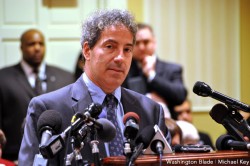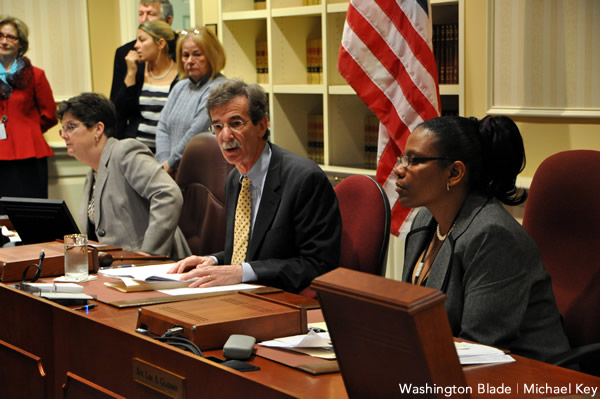Local
Md. Senate hearing on marriage draws hundreds
Governor, Baltimore mayor testify in favor of bill
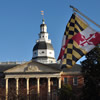
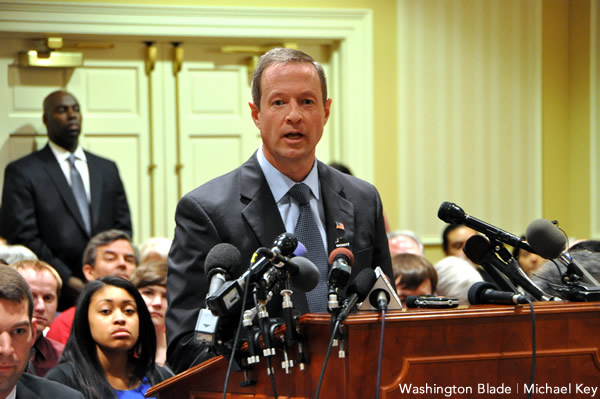
Gov. Martin O'Malley testifies before the Senate Judicial Proceedings Committee Tuesday in favor of the Civil Marriage Protection Act. (Washington Blade photo by Michael Key)
ANNAPOLIS, Md. — Over the course of four hours on Tuesday, opponents and supporters of same-sex marriage delivered compelling testimony before a Maryland Senate committee in hopes of swaying lawmakers on a landmark bill.
The Maryland Senate Judicial Proceedings Committee heard testimony on the Civil Marriage Protection Act throughout the afternoon on the last day of January, as lawmakers, experts, clergy and regular citizens from both sides of the issue shared their feelings on the bill at two minutes a piece.
Gaithersburg resident Stephanie Kreps arrived early to the hearing, proudly wearing a ‘Marylanders for Marriage Equality’ sticker to show her support for the bill as the mother of a gay son.
“It’s simple to me,” Kreps told the Blade. “I have rights that my gay son doesn’t have, and I want those rights for him and all other gay people.”
Kreps was looking forward to hearing the testimony of the bill’s supporters and said she was hopeful for the bill’s prospects considering the Governor’s support this year, and the growing trend toward supporting marriage for same-sex couples in Maryland.
The first witness to testify in favor of the bill was Maryland Gov. Martin O’Malley, who has made the bill part of his 2012 legislative agenda. O’Malley, who had at one time hesitated to support extending full marriage rights to gay couples, has become a proponent of the legislation.
“As you know we already recognize civil marriages that come from other states,” Gov. O’Malley said during his brief testimony, “the civil marriage equality bill draws upon the lessons that we have learned from these other states.”
“This bill balances an individual’s civil marriage rights with the important protections of religious freedoms for all,” O’Malley continued. “And because it protects both of these inalienable rights, it is supported by a broad coalition of Marylanders, which includes clergy, community leaders, faith-based organizations, civil rights groups and those who hold the most important title of all in our democracy, and that title is citizen.”
O’Malley was followed by gay Sen. Richard Madaleno who spoke from the heart about his love for his partner and raising a child, and relayed a story about a walk with his young daughter that expressed the very essence of family.
“We were picking flowers along the way, and she was picking buttercups and dandelions,” Madaleno said. “As she picked a few of the flowers, and went on to pick more, she handed me a little bouquet, and said ‘daddy will you hold my wishes for me?’” When he asked her what she meant, she explained. “She said ‘This is a wishing flower, you blow on it, and you see where your wishes go.’”
“I don’t know why people fall in love, I don’t know exactly why I have fallen in love with Mark as opposed to someone else, but I have, and together we have formed a family, and that family includes children.”
Following Madaleno were Democratic Sens. Jamie Raskin and Robert Garagiola and Republican Sen. Allan Kittleman, as well as Attorney General Douglas Gansler (video below courtesy GoodAsYou), all of whom urged passage of the bill.
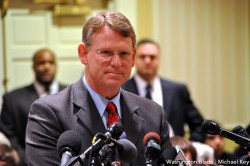
Sen. Kittleman broke ranks with Republicans to support the bill. (Washington Blade photo by Michael Key)
Kittleman, who spoke about his father’s work in the civil rights movement, said he feels so strongly about the legislation because “I really do believe it’s about family, it’s about liberty, it’s about equality.”
“I remember my dad telling me years later that when he was fighting for the civil rights movement, and integration in the public schools in Howard County, and he was talking to people who were opposed to it, especially school board members, the would say things like ‘but you don’t know what will happen if we accept African Americans. Here’s what might happen. They’re going to do this in the hallway,’ or ‘they’ll do this in the classroom,’ or ‘they’ll cause this problem.’ Always ‘might be this’ or ‘might be that.’ What I’m urging you is don’t succumb to the mights. What my father taught me is that you don’t take away someone’s civil rights because of something that might happen. You can deal with the ‘mights’ later on. But make sure we get the civil rights done now. Make sure we get that equality for everyone in our community now.”
“You don’t say no to civil rights because you’re worried about what might happen in the future,” Kittleman concluded.
Raskin, for his part, strongly defended the religious protections in the bill, confirming that churches and church sponsored and operated facilities would be exempt from having to “lend any of its accommodations, programs, or services for the purpose of promoting a marriage it disapproves of for religious reasons.”
However, Raskin was quick to differentiate religious groups and private individuals or businesses, who have been barred in law since 2001 from discriminating against Marylanders in public accommodation because of sexual orientation.
http://www.youtube.com/watch?v=z0aThYUXJ64
Sen. Raskin defends the marriage bill.
Also testifying in favor of the bill was Baltimore Mayor Stephanie Rawlings-Blake.
“I believe that all couples regardless of their sexual orientation, want their children protected under the law,” Rawlings-Blake testified. “Please don’t be mistaken, this bill is about more than those rights, it’s also about civil rights and about equality under the law.”
Both sides were given two hours each to present their witnesses in four parts — the first and third hours in support of the law, and the second and fourth in opposition.
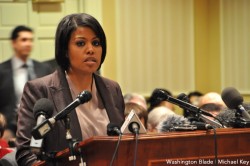
Baltimore mayor Stephanie Rawlings-Blake testifies in favor of the bill. (Washington Blade photo by Michael Key
All told, more than 75 citizens delivered testimony both for and against the bill over a period of four and a half hours. Opposition to the bill ran from the colorful — like local same-sex marriage hearing mainstay Minister Leroy Swailes, who produced groans even from other opponents of the bill — to the passionate; while support ran from the clinically factual to the deeply moving — such as the ardently supportive mother of a lesbian daughter, Penny Nichols.
The supporters also included dozens of same-sex couples raising children, parents of gay children and straight children raised by same-sex couples, all in an attempt to counter arguments by the opposition that same-sex marriage would be detrimental to the development of children in Maryland.
Also testifying in support of the law in the first hour were gay veteran and law enforcement officer Irene Huskens of Fort Washington; president of the Maryland AFL-CIO union, and father of a gay child, Fred Mason; gay federal worker and long-time Maryland resident Candy Holmes; supportive Unitarian-Universalist minister Rev. John Crestwell; and David Rocah, staff attorney at the ACLU of Maryland.
One of the questions that Rocah fielded from committee member Sen. Joseph M. Getty after his testimony dealt with whether the law discriminates against close family members that wish to marry “because of genetics, and the familial relationship is because of genetic relationships.”
“It’s long-standing policy in Maryland to prohibit marriage between people of a particular familial relation,” Rocah answered. “They don’t all relate with genetics. Maryland has prohibited relationships between stepfathers or stepmothers, they’re not genetically related. Different states have different degrees of familial relationships in which marriage is prohibited. I don’t see the issue of discrimination that you’re referring to.”
Both the hearing room itself and an overflow room were filled to capacity through much of the hearing, producing an electric and anxious atmosphere among those in attendance. Same-sex marriage supporters sat next to opponents, making it difficult in many cases to distinguish who was there in favor of and who was there against. Most in attendance could only be differentiated by the round stickers given out by both the proponents and opponents — which themselves were similar in shape, size and coloring.
Among those in the audience in opposition to the bill was Maryland resident Ruby Wilson who says she has concerns about the bill because she believes it will harm children.
“I believe children are being affected already in Massachusetts with the bill that’s there,” Wilson — who says as a Catholic she does not believe gays should adopt children — told the Blade. “In the fifth grade they’re given a book …and it tells all the ways that you can enjoy yourself as a homosexual. I don’t want my grandchildren to have that.”
“Also they said that there’s going to be a conscience clause in this bill for Christians,” Wilson continued. “Well, they just take that to court, and the courts just take it out. And then where are we at? We just have no protection.”
“I’m totally against it,” Wilson said, though she is not opposed to civil unions for same-sex couples. “I’m just opposed to redefining marriage.”
Wilson’s feelings about “redefining marriage” were echoed by Maryland resident Edna Kersey.
“I think that traditionally that is what marriage defines, is a man and a woman, and I feel that they should find another term for the same-sex marriage, or the same-sex union, so that it not tamper with the name that we so long stood on,” Kersey told the Blade. “That’s what our foundation is built on, the tradition marriage, which is between a man and a woman. So its not the union itself, it is the name or the title that they are trying to change.”
However, Kersey tells the Blade that she is not in support of Civil Unions, unlike Wilson.
In the second hour, the opposition first presented Maryland Family Alliance president Pastor Dereck McCoy, who set a cordial, respectful tone.
“Regardless of the tenuous debate that we’re in,” McCoy said, “I think we need to understand that Marylanders are separated on this issue, but it’s a deep and passionate thing in the root and the heart of the communities and many people’s lives.”
However, regardless of the result of the vote, McCoy said the definition of marriage would not change for opponents. “People will still feel that marriage should be defined as one man, and one woman. That does not change.”
Following McCoy was Maryland Baptist ministers Rev. Dr. John Lund, and Rev. Dr. Nate Thomas, as well as Presbyterian pastor Bob Borger, former mega-church pastor Joel Peebles — who recently lost a court battle over control over his Jericho City of Praise Ministry — as well as some Catholic voices such as Pastor of Our Lady of Perpetual Help, Father Eric Arnold, and Maryland Catholic Conference’s Mary Ellen Russell.
“Among those who testified last year, there were some who seemed to bring hatred and prejudice into the hearing,” said Father Arnold. “In fact, the Baltimore Sun reported that at least one Senator changed his stance on the bill because of the demonization that he sensed in some of the testimony. So as I speak to you today, I ask you to please not lump my testimony in with those who may be driven by hatred or prejudice.”
Father Arnold assured the committee that he, and many of those testifying with him, were there with good will.
“We are here today simply to speak on behalf of the wonderful and unique institution of marriage as it exists in between one man and one woman,” he continued, saying that preferring such unions was ‘not prejudice.’ “We ask you to recognize that the family based on a marriage of a man and a woman is a natural institution that is prior to the state.”
Mary Ellen Russell, in the adjacent audio file, seemed to come out both in favor and against civil unions during her testimony (hear her testimony at GoodAsYou.org).
The testimony was concluded by an attorney specializing in representing churches and ministers, Erika Cole, the Beckett Fund for Religious Liberty’s Eric Baxter, and the anti-gay Alliance Defense Fund’s Brian Raum (hear his testimony at ThinkProgress.org).
Several times throughout the proceedings — both the hearing room and the overflow room where the testimony was projected upon two large screens at the fore of the room — parts of the audience erupted into cheers and applause in response to testimony given, often soliciting a stern reminder from committee chair Sen. Brian E. Frosh that for the sake of time, applause was to be held until the end, in recognition of the number of witnesses to get through.
Leading the supporters of the bill to testify in the third hour were the Human Rights Campaign’s Sarah Warbelow, who gave a statement about the way same-sex couples in Maryland were treated unequally in terms of property ownership, child rearing, healthcare and inheritance.
“Hundreds of laws cover the benefits, rights, and obligations of spouses,” Warbelow told the committee. “When same-sex couples cannot participate in marriage, their families are more vulnerable.”
Following Warbelow were Baltimore Presbyterian pastor Andrew Foster Connors, Baltimore’s Rabbi Elyssa Sachs Kohen, Doug Prouty of the Montgomery County Education Association, Henry Dugan president of the Maryland State Bar Association, along with State Bar member Craig Little, Daphne Mcclellan executive director of the National Association of Social Workers Maryland chapter, Rev. Madeleine Beard coordinator of public policy for the Episcopal Diocese of Maryland, MCC Bishop Rev. Darlene Garner and Rev. Jill McCrory Chair of Association of Welcoming and Affirming Baptists.
They were joined by social workers and radio hosts Bob and Lori Hollander, Progressive Maryland Interim Executive Director Kate Planco Waybright, and Ezekiel Jackson political organizer for 1199 SEIU, who said, “as a heterosexual African American man, I’m here for equality.”
http://www.youtube.com/watch?v=qfBGyIhtWfw
A.G. Gansler testifies
Opposition in the fourth hour brought some of the most curious testimony of the day. Openly gay father Doug Mainware lamented the lack of a mother in the lives of his children, and cited his conservative beliefs and “thinking deeply about this issue in a reasoned way,” as impetus for coming to oppose the bill after previously supporting it. Senator Raskin, intrigued by the curiosity of the situation, asked Mainware, “how do you undermine an institution by bringing more people into it?”
Mainware believes that the term belongs specifically to the union between a man and a woman, but did admit he is not opposed to civil unions.
Mainware was followed by a cordial Rob Lucas and anti-gay group MassResistance’s Brian Camenker, who warned lawmakers that parents will lose control over what children are taught in school if marriage is extended to same-sex couples, and even warned about a particular case, frequently cited by same-sex marriage foes, in which David Parker was arrested for opposing a pro-gay curriculum in his child’s school.
Also opposing in the fourth hour were Pastor Victor Kirk, Maryland Gubernatorial candidate Corrogan Vaughn, Ruth Jacobs, Silver Springs pastor Robert Nelson, leader of Maryland Marriage Savers Mike McManus, Pierre Bynum, Chaplain at the Family Research Council, Martha and Ed Jenkins, Todd Braun, the colorful Minister Leroy Swailes, and Grace Harley who opposes the bill but — after reciting from the biblical book of Matthew — proclaimed, “I once lived as a man, I once married a woman in 1978, I’ve been before you many times.”
After the final round of opponents, several prominent supporters were able to give their testimony, including Kate Oliver of the group COLLAGE which brings together the children of gay parents, Rev. Lisa Ward, Liz Seaton of the National Center for Lesbian Rights, Rev. MacArthur Flournoy who had led the clergy rally earlier in the day, president of the Maryland Gay and Lesbian Chamber of Commerce Mark Yost and Episcopal priest Rev. Kathleen Corbet Welsh, a happily partnered lesbian for many decades.
Among these prominent voices was Equality Maryland executive director Carrie Evans, who echoed the sentiments of all of the heartfelt statements that had preceded hers.
“Today you have heard from individuals and families who represent the wonderful and cherished diversity of our great state,” Evans told the committee. “Each person has shared the sometimes personal and touching reasons why you should vote to end marriage discrimination.”
Also in this group was memorable mother of a lesbian daughter at Drexel University, Penny Nichols, who proclaimed “As a devoted mother, I knew my daughter was gay since the second grade.”
“When she finally said to me at the age of 16, ‘mom I’m gay,’ I shocked her with my response, for I hugged my daughter, and I said ‘I’m so proud of you for being your authentic self,” Nichols said. “I want my lesbian daughter to live in a just world.”
“The only obstacle my lesbian daughter should face is her mother’s rule that she cannot marry until after she receives her degrees,” Nichols continued. “I am not gay, but I birthed a gay daughter. I don’t know who’s louder or prouder — she or I — but I will tell you, I think I am outer and prouder!”
After the completion of the last supporters, the committee agreed to exhaust the speaker’s list by giving those remaining — both supporting and opposing — one minute each to add their own testimony.
http://www.youtube.com/watch?v=o-Tsr7rz9Og
District of Columbia
Catching up with the asexuals and aromantics of D.C.
Exploring identity and finding community

There was enough commotion in the sky at the Blossom Kite Festival that bees might have been pollinating the Washington Monument. I despaired of quickly finding the Asexuals and Aromantics of the Mid-Atlantic—I couldn’t make out a single asexual flag among the kites up above. I thought to myself that if it had been the Homosexuals of the Mid-Atlantic I would’ve had my gaydar to rely on. Was there even such a thing as ace-dar?
As it turned out, the asexual kite the group had meant to fly was a little too pesky to pilot. “Have you ever used a stunt kite?” Bonnie, the event organizer asked me. “I bought one. It looked really cool. But I can’t make it work.” She sighed. “I can’t get the thing six feet off the ground.” The group hardly seemed to care. There was caramel popcorn and cookies, board games and head massages, a game of charades with more than its fair share of Pokémon. The kites up above might as well have been a coincidental sideshow. Nearly two dozen folks filtered in and out of the picnic throughout the course of the day.
But I counted myself lucky that Bonnie picked me out of the crowd. If there’s such a thing as ace-dar, it eludes asexuals too. The online forum for all matters asexual, AVEN, or the Asexual Visibility and Education Network, is filled with laments: “I don’t think it’s possible.” “Dude, I wish I had an ace-dar.” “If it exists, I don’t have it.” “I think this is just like a broken clock is right twice a day type thing.” What seems to be a more common experience is meeting someone you just click with—only to find out later that they’re asexual. A few of the folks I met described how close childhood friends of theirs likewise came out in adulthood, a phenomenon that will be familiar to many queer people. But it is all the more astounding for asexuals to find each other this way, given that asexual people constitute 1.7% of sexual minorities in America, and so merely .1% of the population at large.
To help other asexuals identify you out in the world, some folks wear a black ring on their middle finger, much as an earring on the right ear used to signify homosexuality in a less welcoming era. The only problem? The swinger community—with its definite non-asexuality—has also adopted the signal. “It’s still a thing,” said Emily Karp. “So some people wear their ace rings just to the ace meet-ups.” Karp has been the primary coordinator for the Asexuals and Aromantics of the Mid-Atlantic (AAMA) since 2021, and a member of the meet-up for a decade. She clicked with the group immediately. After showing up for a Fourth of July potluck in the mid-afternoon, she ended up staying past midnight. “We played Cards against Humanity, which was a very, very fun thing to do. It’s funny in a way that’s different than if we were playing with people that weren’t ace. Some of the cards are implying, like, the person would be motivated by sex in a way that’s absurd, because we know they aren’t.”
Where so many social organizations withered during the pandemic, the AAMA flourished. Today, it boasts almost 2,000 members on meetup.com. Karp hypothesized that all the social isolation gave people copious time to reflect on themselves, and that the ease of meeting up online made it convenient as a way for people to explore their sexual identity and find community. Online events continue to make up about a third of the group’s meet-ups. The format allows people to participate who live farther out from D.C. And it allows people to participate at their preferred level of comfort: while many people participate much as they would at an in-person event, some prefer to watch anonymously, video feed off. Others prefer to participate in the chat box, though not in spoken conversation.
A recent online event was organized for a discussion of Rhaina Cohen’s book, “The Other Significant Others,” published in February. Cohen’s book discusses friendship as an alternative model for “significant others,” apart from the romantic model that is presupposed to be both the center and goal of people’s lives. The AAMA group received the book with enthusiasm. “It literally re-wired my brain,” as one person put it. People discussed the importance of friendship to their lives, and their difficulties in a world that de-prioritized friendship. “I can break up with a friend over text, and we don’t owe each other a conversation,” one said. But there was some disagreement when it came to the book’s discussion of romantic relationships. “It relegates ace relationships to the ‘friend’ or ‘platonic’ category, to the normie-reader,” one person wrote in the chat. “Our whole ace point is that we can have equivalent life relationships to allo people, simply without sex.” (“Allo” is shorthand for allosexual or alloromantic, people who do experience sexual or romantic attraction.)
The folks of the AAMA do not share a consensus on the importance of romantic relationships to their lives. Some asexuals identify as aromantic, some don’t. And some aromantics don’t identify as asexual, either. The “Aromantic” in the title of the group is a relatively recent addition. In 2017, the group underwent a number of big changes. The group was marching for the first time in D.C. Pride, participating in the LGBTQ Creating Change conference, and developing a separate advocacy and activism arm. Moreover, the group had become large enough that discussions were opened up into forming separate chapters for D.C., Central Virginia, and Baltimore. During those discussions, the group leadership realized that aromantic people who also identified as allosexual didn’t really have a space to call their own. “We were thinking it would be good to probably change the name of the Meetup group,” Emily said. “But we were not 100% sure. Because [there were] like 1,000 people in the group, and they’re all aces, and it’s like, ‘Do you really want to add a non-ace person?’” The group leadership decided to err on the side of inclusion. “You know, being less gatekeep-y was better. It gave them a place to go — because there was nowhere else to go.”
The DC LGBT Center now sponsors a support group for both asexuals and aromantics, but it was formed just a short while ago, in 2022. The founder of the group originally sought out the center’s bisexual support group, since they didn’t have any resources for ace folks. “The organizer said, you know what, why don’t we just start an ace/aro group? Like, why don’t we just do it?” He laughed. “I was impressed with the turnout, the first call. It’s almost like we tapped into, like, a dam. You poke a hole in the dam, and the water just rushes out.” The group has a great deal of overlap with the AAMA, but it is often a person’s first point of contact with the asexual and aromantic community in D.C., especially since the group focuses on exploring what it means to be asexual. Someone new shows up at almost every meeting. “And I’m so grateful that I did,” one member said. “I kind of showed up and just trauma dumped, and everyone was really supportive.”
Since the ace and aro community is so small, even within the broader queer community, ace and aro folks often go unrecognized. To the chagrin of many, the White House will write up fact sheets about the LGBTQI+ community, which is odd, given that when the “I” is added to the acronym, the “A” is usually added too. OKCupid has 22 genders and 12 orientations on its dating website, but “aromantic” is not one of them — presumably because aromantic people don’t want anything out of dating. And since asexuality and aromanticism are defined by the absence of things, it can seem to others like ace and aro people are ‘missing something.’ One member of the LGBT center support group had an interesting response. “The space is filled by… whatever else!” they said. “We’re not doing a relationship ‘without that thing.’ We’re doing a full scale relationship — as it makes sense to us.”
CJ Higgins is a postdoctoral fellow with the Alexander Grass Humanities Institute at Johns Hopkins University.
District of Columbia
Bowser budget proposal calls for $5.25 million for 2025 World Pride
AIDS office among agencies facing cuts due to revenue shortfall

D.C. Mayor Muriel Bowser’s proposed fiscal year 2025 budget includes a request for $5.25 million in funding to support the June 2025 World Pride celebration, which D.C. will host, and which is expected to bring three million or more visitors to the city.
The mayor’s proposed budget, which she presented to the D.C. Council for approval earlier this month, also calls for a 7.6 percent increase in funding for the Mayor’s Office of LGBTQ Affairs, which amounts to an increase of $132,000 and would bring the office’s total funding to $1.7 million. The office, among other things, provides grants to local organizations that provide services to the LGBTQ community.
Among the other LGBTQ-related funding requests in the mayor’s proposed budget is a call to continue the annual funding of $600,000 to provide workforce development services for transgender and gender non-conforming city residents “experiencing homelessness and housing instability.” The budget proposal also calls for a separate allocation of $600,000 in new funding to support a new Advanced Technical Center at the Whitman-Walker Health’s Max Robinson Center in Ward 8.
Among the city agencies facing funding cuts under the mayor’s proposed budget is the HIV/AIDS, Hepatitis, Sexually Transmitted Disease, and Tuberculosis Administration, known as HAHSTA, which is an arm of the D.C. Department of Health. LGBTQ and AIDS activists have said HAHSTA plays an important role in the city’s HIV prevention and support services. Observers familiar with the agency have said it recently lost federal funding, which the city would have to decide whether to replace.
“We weren’t able to cover the loss of federal funds for HAHSTA with local funds,” Japer Bowles, director of the Mayor’s Office of LGBTQ Affairs, told the Washington Blade. “But we are working with partners to identify resources to fill those funding gaps,” Bowles said.
The total proposed budget of $21 billion that Bowser submitted to the D.C. Council includes about $500 million in proposed cuts in various city programs that the mayor said was needed to offset a projected $700 million loss in revenue due, among other things, to an end in pandemic era federal funding and commercial office vacancies also brought about by the post pandemic commercial property and office changes.
Bowser’s budget proposal also includes some tax increases limited to sales and business-related taxes, including an additional fee on hotel bookings to offset the expected revenue losses. The mayor said she chose not to propose an increase in income tax or property taxes.
Earlier this year, the D.C. LGBTQ+ Budget Coalition, which consists of several local LGBTQ advocacy organizations, submitted its own fiscal year 2025 budget proposal to both Bowser and the D.C. Council. In a 14-page letter the coalition outlined in detail a wide range of funding proposals, including housing support for LGBTQ youth and LGBTQ seniors; support for LGBTQ youth homeless services; workforce and employment services for transgender and gender non-conforming residents; and harm reduction centers to address the rise in drug overdose deaths.
Another one of the coalition’s proposals is $1.5 million in city funding for the completion of the D.C. Center for the LGBTQ Community’s new building, a former warehouse building in the city’s Shaw neighborhood that is undergoing a build out and renovation to accommodate the LGBTQ Center’s plans to move in later this year. The coalition’s budget proposal also calls for an additional $300,000 in “recurring” city funding for the LGBTQ Center in subsequent years “to support ongoing operational costs and programmatic initiatives.”
Bowles noted that Bowser authorized and approved a $1 million grant for the LGBTQ Center’s new building last year but was unable to provide additional funding requested by the budget coalition for the LGBTQ Center for fiscal year 2025.
“We’re still in this with them,” Bowles said. “We’re still looking and working with them to identify funding.”
The total amount of funding that the LGBTQ+ Budget Coalition listed in its letter to the mayor and Council associated with its requests for specific LGBTQ programs comes to $43.1 million.
Heidi Ellis, who serves as coordinator of the coalition, said the coalition succeeded in getting some of its proposals included in the mayor’s budget but couldn’t immediately provide specific amounts.
“There are a couple of areas I would argue we had wins,” Ellis told the Blade. “We were able to maintain funding across different housing services, specifically around youth services that affect folks like SMYAL and Wanda Alston.” She was referring to the LGBTQ youth services group SMYAL and the LGBTQ organization Wanda Alston Foundation, which provides housing for homeless LGBTQ youth.
“We were also able to secure funding for the transgender, gender non-conforming workforce program,” she said. “We also had funding for migrant services that we’ve been advocating for and some wins on language access,” said Ellis, referring to programs assisting LGBTQ people and others who are immigrants and aren’t fluent in speaking English.
Ellis said that although the coalition’s letter sent to the mayor and Council had funding proposals that totaled $43.1 million, she said the coalition used those numbers as examples for programs and policies that it believes would be highly beneficial to those in the LGBTQ community in need.
“I would say to distill it down to just we ask for $43 million or whatever, that’s not an accurate picture of what we’re asking for,” she said. “We’re asking for major investments around a few areas – housing, healthcare, language access. And for capital investments to make sure the D.C. Center can open,” she said. “It’s not like a narrative about the dollar amounts. It’s more like where we’re trying to go.”
The Blade couldn’t’ immediately determine how much of the coalition’s funding proposals are included in the Bowser budget. The mayor’s press secretary, Daniel Gleick, told the Blade in an email that those funding levels may not have been determined by city agencies.
“As for specific funding levels for programs that may impact the LGBTQ community, such as individual health programs through the Department of Health, it is too soon in the budget process to determine potential adjustments on individual programs run though city agencies,” Gleick said.
But Bowles said several of the programs funded in the mayor’s budget proposal that are not LGBTQ specific will be supportive of LGBTQ programs. Among them, he said, is the budget’s proposal for an increase of $350,000 in funding for senior villages operated by local nonprofit organizations that help support seniors. Asked if that type of program could help LGBTQ seniors, Bowles said, “Absolutely – that’s definitely a vehicle for LGBTQ senior services.”
He said among the programs the increased funding for the mayor’s LGBTQ Affairs office will support is its ongoing cultural competency training for D.C. government employees. He said he and other office staff members conduct the trainings about LGBTQ-related issues at city departments and agencies.
Bowser herself suggested during an April 19 press conference that local businesses, including LGBTQ businesses and organizations, could benefit from a newly launched city “Pop-Up Permit Program” that greatly shortens the time it takes to open a business in vacant storefront buildings in the downtown area.
Bowser and Nina Albert, D.C. Deputy Mayor for Planning and Economic Development, suggested the new expedited city program for approving permits to open shops and small businesses in vacant storefront spaces could come into play next year when D.C. hosts World Pride, one of the word’s largest LGBTQ events.
“While we know that all special events are important, there is an especially big one coming to Washington, D.C. next year,” Bowser said at the press conference. “And to that point, we proposed a $5.25 million investment to support World Pride 2025,” she said, adding, “It’s going to be pretty great. And so, we’re already thinking about how we can include D.C. entrepreneurs, how we’re going to include artists, how we’re going to celebrate across all eight wards of our city as well,” she said.
Among those attending the press conference were officials of D.C.’s Capital Pride Alliance, which will play a lead role in organizing World Pride 2025 events.
Maryland
Health care for Marylanders with HIV is facing huge cuts this summer
Providers poised to lose three-quarters of funding

BY MEREDITH COHN | By the end of June, health care providers in Maryland will lose nearly three-quarters of the funding they use to find and treat thousands of people with HIV.
Advocates and providers say they had been warned there would be less money by the Maryland Department of Health, but were stunned at the size of the drop — from about $17.9 million this fiscal year to $5.3 million the next. The deep cuts are less than three months away.
The rest of this article can be read on the Baltimore Banner’s website.
-

 State Department3 days ago
State Department3 days agoState Department releases annual human rights report
-

 Maryland4 days ago
Maryland4 days agoJoe Vogel campaign holds ‘Big Gay Canvass Kickoff’
-

 Politics3 days ago
Politics3 days agoSmithsonian staff concerned about future of LGBTQ programming amid GOP scrutiny
-

 The White House2 days ago
The White House2 days agoWhite House debuts action plan targeting pollutants in drinking water

